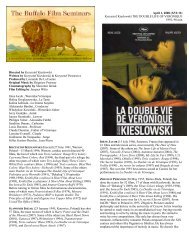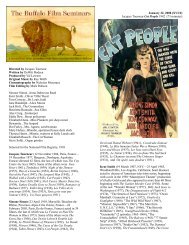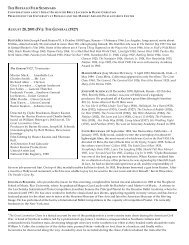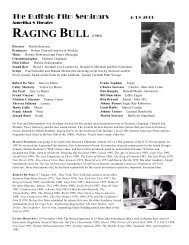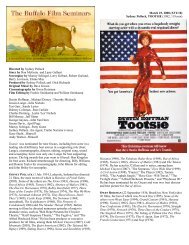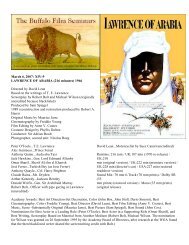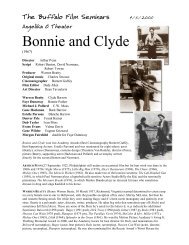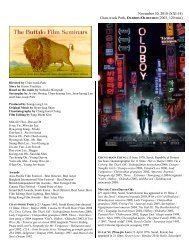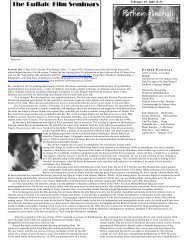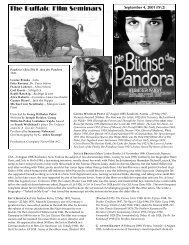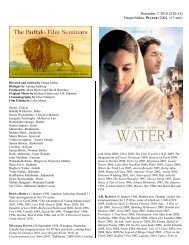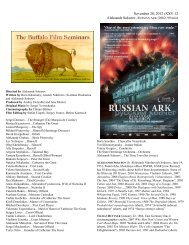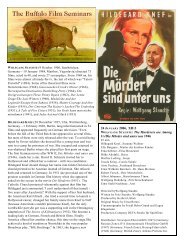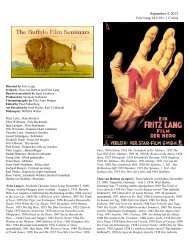Once Upon a Time in the West
Once Upon a Time in the West
Once Upon a Time in the West
- No tags were found...
Create successful ePaper yourself
Turn your PDF publications into a flip-book with our unique Google optimized e-Paper software.
March 20, 2001 (III:9)SERGIO LEONE ( January 1929, Rome,Italy – 30 April 1989, Rome, heartattack) was <strong>the</strong> son of prolific pioneerfilmmaker Roberto Roberti (V<strong>in</strong>cenzoLeone) and movie star Francesa Bert<strong>in</strong>i.He studied law for a time, drifted fromjob to job, entered film <strong>in</strong>dustry <strong>in</strong> 1939, about same time fa<strong>the</strong>rretired from it. Over next 20 years he worked <strong>in</strong> various capacitieson some 60 features, serv<strong>in</strong>g as assistant to Mario Camer<strong>in</strong>i andVittorio de Sica among o<strong>the</strong>r notable Italian directors, later to someAmerican directors do<strong>in</strong>g costume epics—Mervyn LeRoy on QuoVadis 1950, Robert Wise, Helen of Troy 1955, William Wyler Ben Hur1959. He had small act<strong>in</strong>g roles <strong>in</strong> several films, Bicycle Thieves forexample, where he played a young priest. His o<strong>the</strong>r films are C'erauna volta <strong>in</strong> America 1984 (<strong>Once</strong> <strong>Upon</strong> a <strong>Time</strong> <strong>in</strong> America), Un Genio, due compari, unpollo 1975 (The Genius, uncredited), Giù la testa 1971 (Duck, You Sucker/A Fistful ofDynamite/<strong>Once</strong> <strong>Upon</strong> a <strong>Time</strong>... <strong>the</strong> Revolution), Il Buono, il brutto, il cattivo 1966 (TheGood, <strong>the</strong> Bad and <strong>the</strong> Ugly), Per qualche dollaro <strong>in</strong> più 1965 (For a Few Dollars More,released <strong>in</strong> US <strong>in</strong> 1967), Per un pugno di dollari 1964 (as Bob Robertson <strong>in</strong> <strong>the</strong>European pr<strong>in</strong>ts; Fistful of Dollars <strong>in</strong> US 1967), The Last Days of Sodom andGomorrah 1962 (uncredited), Il Colosso di Rodi 1961 (The Colossus of Rhodes), andGli Ultimi giorni di Pompei 1959 (The Last Days of Pompeii, uncredited). Cl<strong>in</strong>tEastwood dedicated Unforgiven 1992 to him. Leone turned down an offer todirect The Godfa<strong>the</strong>r because he was work<strong>in</strong>g on a film he’d wanted to make foryears, <strong>Once</strong> <strong>Upon</strong> a <strong>Time</strong> <strong>in</strong> America—an Italian film about American Jewishgangsters. When he died <strong>in</strong> 1989 he was prepar<strong>in</strong>g “The 900 Days,” a Soviet coproductionabout <strong>the</strong> World War II Siege of Len<strong>in</strong>grad <strong>in</strong> which he planned tostar De Niro.ENNIO MORRICONE (10 November 1928, Rome, Italy, sometimes credited as LeoNichols and Dan Savio) is perhaps <strong>the</strong> most prolific film composer ever. HisIMDB credits list nearly 400 <strong>the</strong>atrical and made-for-tv scores, as well as one TVseries score – “The Virg<strong>in</strong>ian” <strong>in</strong> 1962. He scored all 5 of Leone’s westerns, aswell as The Genius and <strong>Once</strong> <strong>Upon</strong> a <strong>Time</strong> <strong>in</strong> America. Some of his o<strong>the</strong>r film scoreswere for Malèna 2000, Bulworth 1998, Lolita 1997, Wolf 1994, Disclosure 1994, Unepure formalité 1994, In <strong>the</strong> L<strong>in</strong>e of Fire 1993, C<strong>in</strong>ema Paradiso 1991, Bugsy 1991,Hamlet 1990, Money 1990, State of Grace 1990, Casualties of War 1989, TheUntouchables 1987, The Mission 1986, La Cage aux folles 1978, and Days of Heaven1978. Morricone and Leone would often work on <strong>the</strong> script and <strong>the</strong> score at <strong>the</strong>same time, with each writ<strong>in</strong>g <strong>in</strong>to <strong>the</strong> o<strong>the</strong>r’s ideas. Leone would <strong>the</strong>n play <strong>the</strong>music to <strong>the</strong> actors dur<strong>in</strong>g film<strong>in</strong>g, much as music was played on <strong>the</strong> set bysome early silent era directors.C'era una volta il <strong>West</strong> (1969)<strong>Once</strong> <strong>Upon</strong> a <strong>Time</strong> <strong>in</strong> <strong>the</strong> <strong>West</strong>165 m<strong>in</strong>utes, Paramount Pictures[us]Rafran C<strong>in</strong>ematografica [it]San Marco ProductionClaudia Card<strong>in</strong>ale Jill McBa<strong>in</strong>Henry Fonda FrankJason Robards CheyenneCharles Bronson HarmonicaGabriele Ferzetti MortonPaolo Stoppa SamWoody Strode StonyJack Elam KnucklesKeenan Wynn SheriffFrank Wolff Brett McBa<strong>in</strong>Lionel Stander BarmanDirector Sergio LeoneStory Dario Argento, Sergio Leone,and Bernardo BertolucciScript Sergio Donati, Mickey Knox,Sergio LeoneProducer Fulvio MorsellaOrig<strong>in</strong>al music Ennio MorriconeC<strong>in</strong>ematographer Ton<strong>in</strong>o Delli ColliProduction design & Costumes
TONINO DELLI COLLI (20 November 1923, Rome, Italy) didtwo o<strong>the</strong>r films with Leone: The Good, <strong>the</strong> Bad and <strong>the</strong> Ugly,and <strong>Once</strong> <strong>Upon</strong> a <strong>Time</strong> <strong>in</strong> America. He also shot nearly 120o<strong>the</strong>r films, among <strong>the</strong>m La Vita è bella 1997, Life Is Beautiful1997, Death and <strong>the</strong> Maiden 1994, The Name of <strong>the</strong> Rose 1986,G<strong>in</strong>ger e Fred 1986, Pasqual<strong>in</strong>o Settebellezze 1976 (SevenBeauties), Salo, or The 120 Days of Sodom 1975, Lacombe Lucien1974, and Arrivederci Roma 1957 (Seven Hills of Rome).CLAUDIA CARDINALE (15 April 1938, Tunis, Tunisia) got herstart <strong>in</strong> films after w<strong>in</strong>n<strong>in</strong>g a beauty contest. For a whileshe was touted as <strong>the</strong> nextSophia Loren, but even thoughshe appeared <strong>in</strong> more than 100<strong>the</strong>atrical and made-for-tv filmsshe never managed <strong>the</strong> leapfrom sexy Italian actress tomajor <strong>in</strong>ternational star,probably because she nevermanaged to learn English. Sheappears <strong>in</strong> Brigands 1999, Son of<strong>the</strong> P<strong>in</strong>k Pan<strong>the</strong>r 1993, A Man <strong>in</strong>Love 1987, Fitzcarraldo 1982,Ruba al prossimo tuo 1969 (A F<strong>in</strong>ePair), The Professionals 1966, TheP<strong>in</strong>k Pan<strong>the</strong>r 1963, Il Gattopardo 1963 (The Leopard), 8 ½ 1963,Rocco e i suoi fratelli 1960 (Rocco and His Bro<strong>the</strong>rs), and I Solitiignoti 1958 (Big Deal on Madonna Street). She’s <strong>in</strong> two filmswe’ve selected for <strong>the</strong> Fall 2001 BFS series, Il Gattopardo andThe Professionals.HENRY FONDA (16 May 1905, Grand Island, Nebraska – 12August 1982, Los Angeles, heart disease & prostate cancer),one of Hollywood’s mostrespected actors dur<strong>in</strong>g mostof his long career, won hisonly act<strong>in</strong>g Oscar for his lastfilm, On Golden Pond 1981.With a very few exceptions,most notably tonight’s film,he played good guys, orgood-guys-driven-bad, as <strong>in</strong>Jesse James 1939 and TheReturn of Frank James 1940.Some of his o<strong>the</strong>r memorable performances were TheCheyenne Social Club 1970, The Boston Strangler 1968, Fail-Safe1964, The Best Man 1964, Advise and Consent 1962, Warlock1959, 12 Angry Men 1957, Mister Roberts 1955, Fort Apache1948, My Darl<strong>in</strong>g Clement<strong>in</strong>e 1946, The Ox-Bow Incident 1943,The Grapes of Wrath 1940, Young Mr. L<strong>in</strong>coln 1939. His firstrole was with <strong>the</strong> Omaha Community Playhouse, anamateur <strong>the</strong>ater group directed by Marlon Brando’smo<strong>the</strong>r, Dorothy. He won a Tony for Mister Roberts 1948, arole he reprised <strong>in</strong> <strong>the</strong> screen version. Fonda had real-lifetra<strong>in</strong><strong>in</strong>g for that role: he won a Bronze Star for his navalservice <strong>in</strong> WWII. “Like many of <strong>the</strong> men he played on stageand screen,” wrote critic Leonard Malt<strong>in</strong>, “naval officerRoberts was a man of absolute <strong>in</strong>tegrity; this was a qualityaudiences came to associate with Fonda for <strong>the</strong> rest of hislife. It's no accident he played U.S. presidents so often.” Hewon an honorary Oscar <strong>in</strong> 1981 and <strong>the</strong> American FilmInstitute Life Achievement Award <strong>in</strong> 1978.JASON ROBARDS (26 July 1922, Chicago – 26 December2000, Bridgeport,Connecticut, lung cancer)came to dramatic fame foroff-Broadway performanceas Hickey <strong>in</strong> EugeneO’Neill’s The Iceman Cometh.The play ran 500performances, a record for anon-musical. He followedthat with <strong>the</strong> first stage production of Long Day’s Journey<strong>in</strong>to Night. Iceman was broadcast by what was <strong>the</strong>n calledNational Educational Television <strong>in</strong> 1960; it was one of <strong>the</strong>landmark events of early television. In his later years hereturned to TV work, much of it notable, e.g. Inherit <strong>the</strong>W<strong>in</strong>d 1988, The Long Hot Summer 1985, and Sakharov 1984.Some of his films are Magnolia 1999, A Thousand Acres 1997,Philadelphia 1993, Melv<strong>in</strong> and Howard 1980, Julia 1977, All <strong>the</strong>President's Men 1976, Pat Garrett and Billy <strong>the</strong> Kid 1973, TheBallad of Cable Hogue 1970, A Thousand Clowns 1965, andLong Day's Journey Into Night 1962. He won best support<strong>in</strong>gactor Academy Awards for All <strong>the</strong> President's Men and Julia.He also won Obi, Tony and Emmy awards. Robards was <strong>in</strong>Pearl Harbor when <strong>the</strong> Japanese attacked it on December7, 1941; he spent seven years <strong>in</strong> <strong>the</strong> navy and was awarded<strong>the</strong> Navy Cross (equivalent to <strong>the</strong> army’s Dist<strong>in</strong>guishedService Cross, second only to <strong>the</strong> Medal of Honor).CHARLES BRONSON (Charles Buch<strong>in</strong>sky, 3 November1921, Ehrenfeld, Pennsylvania) plays cops, tough guys,avengers. He’s probably best known to recentaudiences for his portrayal of Paul Kersey, that untir<strong>in</strong>gserial killer of malefactors <strong>in</strong> <strong>the</strong> five Death Wish films. Acreepy number of his o<strong>the</strong>r films <strong>in</strong> <strong>the</strong> past 20 yearshave <strong>the</strong> words “death” or “killer” or “assass<strong>in</strong>ation” <strong>in</strong><strong>the</strong>ir titles. He has appeared <strong>in</strong> slightly over 100 films,among <strong>the</strong>m The White Buffalo 1977, Hard <strong>Time</strong>s 1975,The Mechanic 1972, The Valachi Papers 1972, Red Sun1971, The Dirty Dozen 1967, The Great Escape 1963, TheMagnificent Seven 1960, Apache 1954, House of Wax 1953, andYou're <strong>in</strong> <strong>the</strong> Navy Now 1951. His appearance as Harmonica<strong>in</strong> <strong>Once</strong> <strong>Upon</strong> a <strong>Time</strong> <strong>in</strong> <strong>the</strong> <strong>West</strong> is at least partly an attemptat catchup: Leone had offered him <strong>the</strong> role of <strong>the</strong> unnamedgunsl<strong>in</strong>ger <strong>in</strong> A Fistful of Dollars but, <strong>in</strong> what was perhaps<strong>the</strong> worst career move he ever made, he turned it down.The role went to you-know-whom. Accord<strong>in</strong>g to LeonardMalt<strong>in</strong>, “Bronson was one of fifteen children born toLithuanian immigrant parents, and though he was <strong>the</strong> onlymember of <strong>the</strong> family to complete high school, he jo<strong>in</strong>edhis bro<strong>the</strong>rs work<strong>in</strong>g <strong>in</strong> <strong>the</strong> coal m<strong>in</strong>es to support <strong>the</strong>family. He served dur<strong>in</strong>g World War 2 as a tailgunner, <strong>the</strong>nused his G.I. Bill rights to study art <strong>in</strong> Philadelphia and,<strong>in</strong>trigued by act<strong>in</strong>g, enrolled at California's Pasadena
Playhouse. An <strong>in</strong>structor <strong>the</strong>re recommended him todirector Henry Hathaway for a movie role and <strong>the</strong> resultwas Buch<strong>in</strong>sky's debut <strong>in</strong> You're <strong>in</strong> <strong>the</strong> Navy Now 1951.”WOODY STRODE Woodrow Wilson Strode, 28 July 1914,LosAngeles – 31 December 1994, Glendora, California, lungcancer said his favorite of his threescore film roles was <strong>in</strong>John Ford’s Sergeant Rutledge 1960. He dueled Kirk Douglas<strong>in</strong> Spartacus 1960 and attended John Wayne <strong>in</strong> The ManWho Shot Liberty Valance. Before becom<strong>in</strong>g an actor Strodewas an athlete, first <strong>in</strong> <strong>the</strong> decathlon and football at UCLA,<strong>the</strong>n as one of <strong>the</strong> four black men who <strong>in</strong>tegrated <strong>the</strong> NFL<strong>in</strong> 1946 (<strong>the</strong> o<strong>the</strong>rs were Bill Willis, Marion Motley, andKenny Wash<strong>in</strong>gton).JACK ELAM (13 November 1916, Miami, Arizona) has thatwild-eyed look because he was bl<strong>in</strong>ded <strong>in</strong> his left eye <strong>in</strong> afight when he was a kid. He used to play bad guys but ashe’s gotten older and, he says, “too fat to get on a horse”he’s played friendly greybeards, mostly <strong>in</strong> a lot of madefor-tvfilms over <strong>the</strong> past 20 years. Some of his many filmsare The Cannonball Run 1981, The Apple Dumpl<strong>in</strong>g Gang RidesAga<strong>in</strong> 1979, Pat Garrett and Billy <strong>the</strong> Kid 1973, Gunfight at <strong>the</strong>O.K. Corral 1957, Kiss Me Deadly 1955, Cattle Queen ofMontana 1954, High Noon 1952, Rancho Notorious 1952 andThe Gunfighter 1950.LIONEL STANDER (11 January 1908,The Bronx – 30November 1994,Los Angeles, California, lung cancer)appeared <strong>in</strong> more than 100 films and tv series <strong>in</strong> a careerthat began <strong>in</strong> 1932. He has no film credits between St.Benny <strong>the</strong> Dip <strong>in</strong> 1951 and The Mov<strong>in</strong>g F<strong>in</strong>ger <strong>in</strong> 1963. That’sbecause he was blacklisted for tell<strong>in</strong>g <strong>the</strong> HouseCommittee on UnAmerican Activities what he thought of<strong>the</strong>ir hear<strong>in</strong>gs ra<strong>the</strong>r than giv<strong>in</strong>g <strong>the</strong>m names. Standerworked for several years on <strong>the</strong> highly successful tv series“Hart to Hart,” as well as <strong>the</strong> five reprises of <strong>the</strong> series1993-1995.…The director John Boorman said, “In <strong>Once</strong> <strong>Upon</strong> a <strong>Time</strong> <strong>in</strong> <strong>the</strong> <strong>West</strong>, <strong>the</strong> <strong>West</strong>ernreaches its apo<strong>the</strong>osis. Leone’s title is a declaration of <strong>in</strong>tent and also his gift to Americaof its lost fairy stories. This is <strong>the</strong> k<strong>in</strong>d of masterpiece that can occur outside trends andfashion. It is both <strong>the</strong> greatest and <strong>the</strong> last <strong>West</strong>ern.”…Leone’s fa<strong>the</strong>r used <strong>the</strong> stage name Roberto Roberti <strong>in</strong> imitation of <strong>the</strong> famous actorRuggero Roggeri, mostly to hide from his family <strong>the</strong> fact he was <strong>in</strong> a <strong>the</strong>atrical tour<strong>in</strong>ggroup. They would have dis<strong>in</strong>herited him; <strong>the</strong>y thought he was practic<strong>in</strong>g as abarrister <strong>in</strong> Tur<strong>in</strong>.…Leone wanted Henry Fonda and he was hard to get. Fonda told Eli Wallach hewasn’t wild about <strong>the</strong> script and Wallach said to ignore it, to go and he’d fall <strong>in</strong> lovewith Sergio. Fonda agreed to meet him <strong>in</strong> person and told Leone he was used to oldmethods, that if he accepted he wanted to give full authority to <strong>the</strong> director, thatbefore he agreed to anyth<strong>in</strong>g he wanted to see Leone’s films. Early one morn<strong>in</strong>g <strong>in</strong> aprivate projection booth he saw without <strong>in</strong>terruption Fistful of Dollars, For a Few DollarsMore, The Good, The Bad and <strong>the</strong> Ugly . When he came out, it was already late afternoon.“Where’s <strong>the</strong> contract?” was <strong>the</strong> first th<strong>in</strong>g he said.Cheyenne: Hey, you could make thousands of dollars... Hundreds of thousands ofdollars... Even thousands of thousands of dollars...Harmonica: They call 'em millions.From SERGIO LEONE Someth<strong>in</strong>g To Do With Death. Christopher Frayl<strong>in</strong>g NY 2000Sergio Leo ne once said “I was born <strong>in</strong> a c<strong>in</strong>ema, almost. Bothmy parents worked <strong>the</strong>re. My life, my read<strong>in</strong>g, everyth<strong>in</strong>gabout me revolve s around <strong>the</strong> c<strong>in</strong>ema. So for me, c<strong>in</strong>ema islife, and vice-versa.” He first wandered onto a sound stage atC<strong>in</strong>ecittà <strong>in</strong> 1941, at <strong>the</strong> age of twelve, to watch his fa<strong>the</strong>rshoot<strong>in</strong>g a film. And he died watch<strong>in</strong>g a film on television, <strong>in</strong>Rome, at <strong>the</strong> age of sixty. As we will see, for Leone, <strong>the</strong>passionate experience of movie-go<strong>in</strong>g, <strong>the</strong> ideas andsensations it unleashed <strong>in</strong> him, <strong>in</strong>forme d all of his work <strong>in</strong>c<strong>in</strong>ema. Leone was <strong>the</strong> first modern c<strong>in</strong>easte to m ake reallypopular films: films which never<strong>the</strong>le ss rema<strong>in</strong>ed personal tohim. In <strong>the</strong> words of philosopher Jean Baudrillard, he was“<strong>the</strong> first postmodernist director.”“The attractio n of <strong>the</strong> <strong>West</strong>ern, for me,” he said, “is quitesimply this. It is <strong>the</strong> ple asure of do<strong>in</strong>g justice, all by m yself,without hav<strong>in</strong>g to ask anyone’s permission. BANG BANG!”“The Americans have <strong>the</strong> horrible habit, amo ng o<strong>the</strong>r habits,of water<strong>in</strong>g <strong>the</strong> w<strong>in</strong>e of <strong>the</strong>ir mythical ideas with <strong>the</strong> water of<strong>the</strong> American way of life–a way of life, <strong>in</strong>cidentally, whichisn’t of <strong>in</strong>terest to any one who has his head on his shoulders.Take Do ris Day. There is a vision of America <strong>in</strong> her films,
were issued, <strong>the</strong> sequence was deleted from <strong>the</strong> f<strong>in</strong>al edit.The same happened with a sequence <strong>in</strong> For a Few Dollars Morewhere Eastwood goes to bed with a hotel receptionist. It wasas if <strong>the</strong> self-conta<strong>in</strong>ed, iconic hero would be dim<strong>in</strong>ished if heshowed his vulnerability <strong>in</strong> this way. Confronted byaccusations of misogyny, Sergio Leone tended to reply thathis films were mythic: Homeric, even–con cerned with “asimple world of adventure and of uncomplicated men—amascul<strong>in</strong>e world.” …In all his comments on historicalresearch, he never once mentioned <strong>the</strong> studies of pioneer<strong>in</strong>gwomen (<strong>the</strong> repr<strong>in</strong>t<strong>in</strong>g of memoirs, letters and diaries; <strong>the</strong>publication of women’s histories of <strong>the</strong> frontier process) thatwere just beg<strong>in</strong>n<strong>in</strong>g to em erge <strong>in</strong> <strong>the</strong> late 1960s. He regularlyscorned <strong>the</strong> perfunctory presentation of female characters <strong>in</strong><strong>the</strong> classic Hollywood <strong>West</strong>erns…. Leone’s daughter Raffaelladefends this apparent <strong>in</strong>difference to w omen displayed <strong>in</strong> hisfilms: “When asked why women played such a small part <strong>in</strong>his films, he’d say, “Well, <strong>the</strong>re are three strong women athome–Carla, Raffaella and Francesca–and that’s maybe <strong>the</strong>reason!” Carla adds, “Women had an essential role <strong>in</strong> his life,so <strong>in</strong> his films he couldn’t just show <strong>the</strong>m as props.”S<strong>in</strong>ce Leo ne was so set on buck<strong>in</strong>g <strong>West</strong>ernconventions, it was appropriate on this occasion to centre <strong>the</strong>film on a resourceful and powerful w oman. “Jill represents<strong>the</strong> water, <strong>the</strong> promise of <strong>the</strong> <strong>West</strong>, <strong>the</strong> plot revolves aroundher and she’s <strong>the</strong> only one who survives.” But it seems Leonedidn’t ‘<strong>in</strong>vent’ this aspect of <strong>the</strong> story at all. It was BernardoBertolucci: “I’m still very proud of my contribution to thattreatment. I conv<strong>in</strong>ced Leone to <strong>in</strong>troduce <strong>the</strong> character of awoman, for <strong>the</strong> first time. He took Leone to see Johnny Guitar,a film that centres on two remarkable females. “I was talk<strong>in</strong>gto him about a scene [<strong>in</strong>volv<strong>in</strong>g Charles Bronson, after he hasrecovered from <strong>the</strong> gunfight at Cattle Corner Station. It wasfilmed, but cut from <strong>the</strong> f<strong>in</strong>al version]. The hero goes <strong>in</strong>to asmall hotel, throws himself on to <strong>the</strong> bed, and says to <strong>the</strong> girl,‘Take off my boots’ (and she takes <strong>the</strong>m off), ‘Massage myfeet’ (and she starts to massage his feet). This should havebeen <strong>the</strong> beg<strong>in</strong>n<strong>in</strong>g of an erotic encounter. But Leone<strong>in</strong>terrupted me: ‘Yeah, yeah. She massages his feet slowly,very slowly. . .and he falls asleep.’ He had a tendency toneutralize <strong>the</strong> possibility of a sexual relationship.”[Jill’s] function <strong>in</strong> <strong>the</strong> film is crucial: she br<strong>in</strong>gs <strong>in</strong>to focus all<strong>the</strong> o<strong>the</strong>r ‘worn-out stereotypes’ and is <strong>the</strong> on ly characte r tosurvive and adjust to <strong>the</strong> modern world. Never<strong>the</strong>less, Leonewaspresent<strong>in</strong>gher survivalat <strong>the</strong> endwithambiguity:“From onepo<strong>in</strong>t of view, it is optimistic—<strong>in</strong> that a great nation has beenborn… . It’sbeen adifficult birth,but all <strong>the</strong> violence has made <strong>the</strong> greatness possible. Fromano<strong>the</strong>r po<strong>in</strong>t of view, it is pessimistic, undoubtedly— because<strong>the</strong> <strong>West</strong> has given way to <strong>the</strong> great American matriarchy, <strong>the</strong>worship of “mom”. America has come to be based on this, and<strong>the</strong> arrival of <strong>the</strong> railroad ushers <strong>in</strong> <strong>the</strong> beg<strong>in</strong>n<strong>in</strong>g of a worldwithout ba lls. The great force <strong>in</strong> American life— part of itsformidable success story— is based on w omen with iron balls,so to speak. I’m pretty sure that Rockefeller’s grandmo<strong>the</strong>rcame from a whorehouse <strong>in</strong> New Orleans.”‘The vice-presidents of <strong>the</strong> companies I have had deal<strong>in</strong>gswith have all had baby-blue eyes and honest faces and whatsons of bitches <strong>the</strong>y turned out to be! Besides Fonda is nosa<strong>in</strong>t himself. H e has had five wives. The last one fell out of aw<strong>in</strong>dow while try<strong>in</strong>g to murder him. He stepped over herbody and went to <strong>the</strong> <strong>the</strong>atre to act his part <strong>in</strong> Mr Roberts as ifnoth<strong>in</strong>g whatever had happened.’‘The rhythm of <strong>the</strong> film. . .was <strong>in</strong>tended to c reate <strong>the</strong> lastgasps that a person takes just before dy<strong>in</strong>g. <strong>Once</strong> <strong>Upon</strong> a <strong>Time</strong><strong>in</strong> <strong>the</strong> <strong>West</strong> was, from start to f<strong>in</strong>ish, a dance of death. All <strong>the</strong>characters <strong>in</strong> <strong>the</strong> film, except Claudia, are conscious of <strong>the</strong>fact that <strong>the</strong>y will not arrive at <strong>the</strong> end alive…. .And I wantedto make <strong>the</strong> audience feel, <strong>in</strong> three hours, how <strong>the</strong>se peoplelived and died—as if <strong>the</strong>y had spent ten days with <strong>the</strong>m.”Jo<strong>in</strong> us next week, Tuesday March 20, for nearly everybody <strong>in</strong> Peter Bogdonavich’sTHE LAST PICTURE SHOW...ema il Diane Ch ristian : engdc@acsu.buffalo.edu…email Bruce Jackson bjackson@buffalo.edu...for th e series s chedu le, l<strong>in</strong>ks a nd up dates : www.buffalofilmsem<strong>in</strong>ars.comTHE BUFFALO FILM SEMINARS ARE PRESENTED BY THE MARKET ARCADE FILM & ARTS CENTER &



